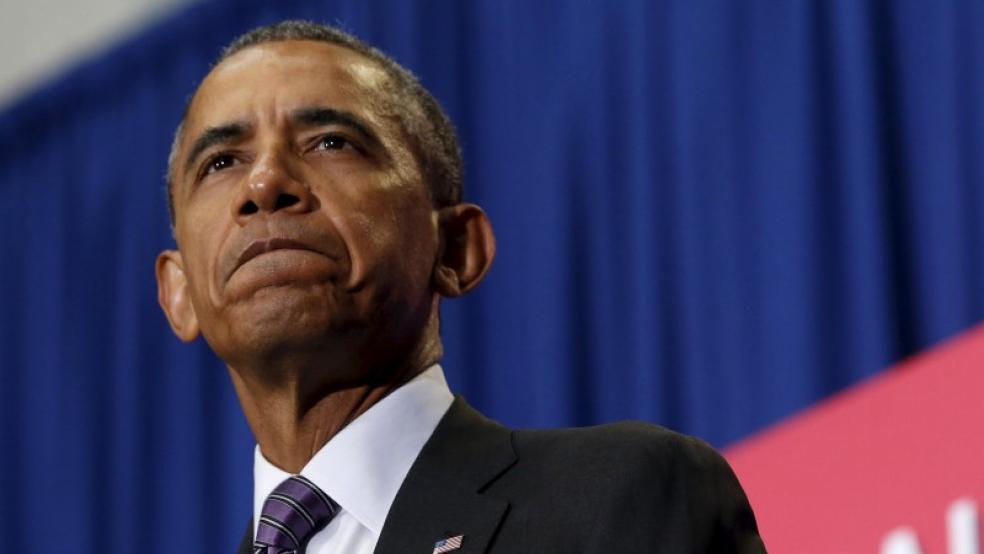In a move steeped in election year politics and growing concern about upheaval and warfare in the Middle East, many Senate Democrats joined with their Republican colleague to pass a $612 billion National Defense Authorization Act despite strong opposition from President Obama.
The massive legislation, crafted by Armed Services Committee Chair John McCain (R-AZ) and other defense hawks, provides overall defense policy directives and spending priorities for the Department of Defense for the coming year. While the administration and Republicans clashed on a number of issues, the central argument was over the Republicans efforts to raise the defense spending cap by $38 billion next year without providing comparable new spending for Obama’s signature domestic programs.
Related: Defense Budget Fight: Obama Won’t Back Down on Veto Threat
The president has vowed to veto the bill if it reaches his desk in its current state and is insisting that differences over defense and domestic spending priorities be put off until the White House and Congressional leaders have a chance to negotiate a mini-budget deal before the end of the year. As it stands now, the new defense authorization bill would allow Republicans to funnel the $38 billion to the Pentagon’s general operating budget through a special contingency account set up to finance the wars in Afghanistan and Iraq that is exempt from the spending caps.
White House Press Secretary Josh Earnest earlier this week called the GOP’s plan an “irresponsible way to fund our national defense priorities” and stressed that the president would reject it if it reaches his desk.
The Senate voted 70 to 27 to approve the measure and send it to the House for action. In all, 20 Democrats, along with Sen. Angus King of Maine, an Independent who caucuses with the Democrats, voted to approve the policy blueprint. That total is three more than necessary to overcome Obama’s promised veto. However, Democratic leaders argue that several members who supported the legislation would change their vote if asked to override the president.
“The president is going to veto this. Everyone knows this,” Senate Minority Leader Harry Reid (D-Nev.) said ahead of the vote, according to The Hill. “The House, if they are called upon first to sustain the veto, they will do it. If we’re called up on first to sustain the veto, we will do it.”
Related: Pentagon’s $90 Billion ‘Slush Fund’ Comes Under Attack
The Senate action comes at a time of growing unease on Capitol Hill over a seemingly endless stream of crises overseas – including the growth in strength of ISIS in the Middle East, the spectacle of millions of refugees seeking safe haven in Europe, and Russian intervention in the Syrian civil war. Both parties are calling for a stronger U.S. military and bracing for the possibility that the U.S., will have to maintain a sizeable residual force of troops in Iraq and Afghanistan for years to come.
Having to vote against a major defense bill at this time at the behest of a lame duck president is a tough task for any Democrat, including those who must stand for reelection in 2016. Some Democrats, including members of the Senate Armed Services Committee that helped craft the compromise bill, have bristled over the president’s veto threat since the measure is an authorization bill and does not actually appropriate money for defense. Congress must separately approve appropriations legislation to enable federal funds to flow to the Pentagon and other federal agencies.
The administration argues that to sign the bill would be a tacit endorsement of the GOP’s plan to funnel the $38 billion into the Pentagon’s war fund, allowing the agency to avoid sequestration budget caps under the 2011 Budget Control Act while leaving them in place for domestic spending. The White House also opposes the bill in large part because of provisions that prevent the Obama from closing the U.S. detention facility in Guantanamo Bay, Cuba.
Related: House and Senate Duke It Out Over Defense Spending
Congress has routinely passed a defense authorization bill for over 50 consecutive years and it typically is considered one of the most important annual tasks of lawmakers. McCain, who lost to Obama in the 2008 presidential campaign, said that it would be “shameful” if Obama vetoed the defense bill this year.
Senate Majority Leader Mitch McConnell (R-KY) also chimed in, saying that if the president vetoes the bill, “It will be the latest sorry chapter in a failed foreign policy based on campaign promises rather than policies to realistically meet the threats before us.”






